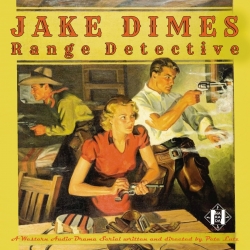 Our penultimate episode for Season 13 is a doozy with Graphic Audio‘s adaptation of the classic Robert E. Howard Western, “The Last Ride”. Part One begins right here…
Our penultimate episode for Season 13 is a doozy with Graphic Audio‘s adaptation of the classic Robert E. Howard Western, “The Last Ride”. Part One begins right here…
Category: Podcast (Page 68 of 124)
 Tonight Jack and David go over some plans for the upcoming next seasons of the Sonic Society, Patreon possibilities, MAD-CON 2020 dates, and new projects. Our feature is from David Carlson’s epic The Hyacinth Disaster. And we had time after the credits for the incredible Cayenne Chris Conroy as he begins the adventure of a lifetime! In Tekdiff Daily with “Fun with Steve”!
Tonight Jack and David go over some plans for the upcoming next seasons of the Sonic Society, Patreon possibilities, MAD-CON 2020 dates, and new projects. Our feature is from David Carlson’s epic The Hyacinth Disaster. And we had time after the credits for the incredible Cayenne Chris Conroy as he begins the adventure of a lifetime! In Tekdiff Daily with “Fun with Steve”!
 Tonight David may be soloing, but he’s not alone with so many great shorts, it’s an audio anthology with “Nowhere Cruisers” and “The Benjamin Swann Exhibit” from Danny Sachs. “Holocausts of our Lives” from the classic X-Cursion Theatre, Adventure Alley‘s “A Desert Journey” and finally but not least the hilarious Legendsmith Automaton Anthologies with their automated parody of “Harry Potter and the Portrait of What Looks Like a Pile of Ash”
Tonight David may be soloing, but he’s not alone with so many great shorts, it’s an audio anthology with “Nowhere Cruisers” and “The Benjamin Swann Exhibit” from Danny Sachs. “Holocausts of our Lives” from the classic X-Cursion Theatre, Adventure Alley‘s “A Desert Journey” and finally but not least the hilarious Legendsmith Automaton Anthologies with their automated parody of “Harry Potter and the Portrait of What Looks Like a Pile of Ash”
 Tonight we conclude David Farquhar and Voices in the Wind Audio Theatre newest thriller “The Geminus Conspiracy”!
Tonight we conclude David Farquhar and Voices in the Wind Audio Theatre newest thriller “The Geminus Conspiracy”!
 Tonight David Farquhar from Voices in the Wind Audio Theatre brings us another spectacular original tale with part one of “The Geminus Conspiracy”.
Tonight David Farquhar from Voices in the Wind Audio Theatre brings us another spectacular original tale with part one of “The Geminus Conspiracy”.
 Tonight Jeffrey Billard, Lothar Tuppan, and Jack meet to talk about another of the Amigo’s favourite shows- The New Adventures of Sherlock Holmes and The Speckled Band!
Tonight Jeffrey Billard, Lothar Tuppan, and Jack meet to talk about another of the Amigo’s favourite shows- The New Adventures of Sherlock Holmes and The Speckled Band!
The Amigos talk about the various incarnations of Sherlock and Watson and how incredible the team of Rathbone and Bruce were through this, one of the most popular Old Time Radio incarnations.
 Pete Lutz of Narada Radio Company brings to the Sonic Society this week- Jake Dimes, Range Detective. Jack and David saddle up for an exciting western adventure!
Pete Lutz of Narada Radio Company brings to the Sonic Society this week- Jake Dimes, Range Detective. Jack and David saddle up for an exciting western adventure!
 This week in the Sonic Society, master storyteller, Frederick Greenhalgh and FinalRune team up with Gen-Z Media to produce a children’s tale based on Mayan Folklore called The Mayan Crystal. Jack and David bring you the first four episodes of this amazing journey!
This week in the Sonic Society, master storyteller, Frederick Greenhalgh and FinalRune team up with Gen-Z Media to produce a children’s tale based on Mayan Folklore called The Mayan Crystal. Jack and David bring you the first four episodes of this amazing journey!
 Tonight Beth Crane and Battlebird Productions presents a hilarious sci-fi sitcom “We Fix Space Junk”!
Tonight Beth Crane and Battlebird Productions presents a hilarious sci-fi sitcom “We Fix Space Junk”!
 Tonight Rick Coste brings us the first of his new show Pixie! And our second feature is the latest of the EVP collection Wavefront Shorts with “Pets” starring the lads Rich Wentworth and Michael McQuilkin from Hadron Gospel Hour and produced by Rich Frolich of Texas Radio Theatre.
Tonight Rick Coste brings us the first of his new show Pixie! And our second feature is the latest of the EVP collection Wavefront Shorts with “Pets” starring the lads Rich Wentworth and Michael McQuilkin from Hadron Gospel Hour and produced by Rich Frolich of Texas Radio Theatre.
